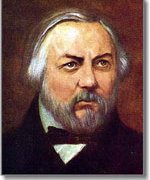
Mikhail Ivanovich Glinka
Mikhail Ivanovich Glinka (June 1, 1804 February 15, 1857) was the first Russian composer to gain wide recognition outside his own country, and is often regarded as the father of Russian music. His work was an important influence on future composers from that country, notably the members of the Mighty Handful, who took Glinka's lead and produced a distinctively Russian kind of classical music. Among his works are the operas A Life for the Tsar (Zhizn za tsarya) and Ruslan and Lyudmila, with a libretto written by Aleksandr Pushkin. Glinka was the son of a wealthy merchant. This afforded him the opportunity to spend much of his youth being schooled in many countries across Europe where he soaked up the culture of the more artistically advanced European countries. His education in music theory was minimal and chose instead to associate himself with the poets and artists of the time instead of fellow composers. During this period there was little to no Russian national music. Instead the aristocracy imported their music from the major musical countries such as Germany, France, and Italy. Inspired by the work of Vincenzo Bellini and Gaetano Donizetti, he set out to write the first wholly Russian opera.His first opera A Life for the Tsar, composed in 1836 on commission by Baron G.F. Rosen, was hailed with great success. It was one of the first widely accepted Russian operas. Parts were based on Russian folk songs but a majority was structured in the conventional Italian style. His second opera, Ruslan and Lyudmila was composed in 1842. This one was not as well received, with the poor performance quality largely to blame. The opera can be characterized by its liberal use of folk songs as well as some innovative use of dissonance, chromaticism, and whole-tone scales. Nevertheless, this second opera solidified the existence of a national classical style that was to be followed up by the next generation of Russian composers.